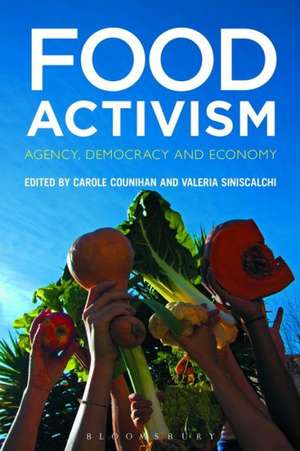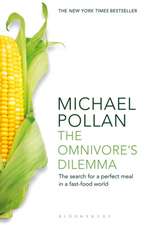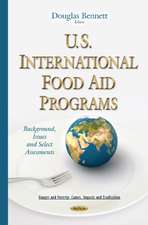Food Activism: Agency, Democracy and Economy
Editat de Prof Carole Counihan, Valeria Siniscalchien Limba Engleză Paperback – 4 dec 2013
| Toate formatele și edițiile | Preț | Express |
|---|---|---|
| Paperback (1) | 180.16 lei 3-5 săpt. | |
| Bloomsbury Publishing – 4 dec 2013 | 180.16 lei 3-5 săpt. | |
| Hardback (1) | 775.02 lei 6-8 săpt. | |
| Bloomsbury Publishing – 4 dec 2013 | 775.02 lei 6-8 săpt. |
Preț: 180.16 lei
Preț vechi: 208.44 lei
-14% Nou
Puncte Express: 270
Preț estimativ în valută:
34.48€ • 35.69$ • 29.14£
34.48€ • 35.69$ • 29.14£
Carte disponibilă
Livrare economică 12-26 februarie
Preluare comenzi: 021 569.72.76
Specificații
ISBN-13: 9780857858337
ISBN-10: 0857858335
Pagini: 264
Ilustrații: 15 bw illus
Dimensiuni: 156 x 234 x 10 mm
Greutate: 0.42 kg
Ediția:New.
Editura: Bloomsbury Publishing
Colecția Bloomsbury Academic
Locul publicării:London, United Kingdom
ISBN-10: 0857858335
Pagini: 264
Ilustrații: 15 bw illus
Dimensiuni: 156 x 234 x 10 mm
Greutate: 0.42 kg
Ediția:New.
Editura: Bloomsbury Publishing
Colecția Bloomsbury Academic
Locul publicării:London, United Kingdom
Caracteristici
The first edited collection examining food activism, rich in ethnographies from high-calibre international contributors making this particularly attractive to cultural, political and economic anthropologists
Notă biografică
Carole Counihan is Professor Emerita of Anthropology at Millersville University, USA.Valeria Siniscalchi is Associate Professor at the École des Hautes Études en Sciences Sociales in Marseille, France.
Cuprins
IntroductionEthnography of Food Activism - Valeria Siniscalchi, École Des Hautes Études En Sciences Sociales, France and Carole Counihan, Millersville University, USALocal EngagementsFood Activism in Western Oregon - Joan E. Gross, Oregon State University, USAEngaging Latino Immigrants in Seattle Food Activism - Teresa M. Mares, University of Vermont, USAResistance and Household Food Consumption in Santiago De Cuba - Hanna Garth, University of California at Los Angeles, USAWomen, Gender and Food Activism in Italy - Carole Counihan, Millersville University, USAThe Movement to Reinvigorate Local Food Culture in Kyoto, Japan - Greg De St. Maurice, University of Pittsburgh, USANational ActionsFrench Biodynamic Viticulture: Militancy or Market Niche? - Marie-France Garcia Parpet, Institut De La Recherche Agronomique, FranceSicilian 'Antimafia' Food Production Cooperatives - Theodoros Rakopoulos, Goldsmiths College London, UKThe Canadian Wheat Board Struggle: Taking Freedom and Democracy to Market - Birgit Müller, Centre National De La Recherche Scientifique, FranceBrothers in Faith: Islamic Food Activism in Egypt - Nefissa Naguib, University of Bergen, NorwayTransnational NetworksInformation, Transparency and Democracy in the Global Coffee Trade - Daniel Reichman, University of Rochester, USA"Cultures of Corn" and Anti-GM Activism in Mexico and Colombia - Elizabeth Fitting, Dalhousie University, CanadaPeasants' Transnational Mobilization for Food Sovereignty in La Vía Campesina - Delphine Thivet, École Des Hautes Études En Sciences Sociales, FranceOscillating Between Village and Globe: Articulating Food in Sri Lankan Activism - Wim Van Daele, Vrije Universiteit Brussel, BelgiumSlow Food Activism Between Politics and Economy - Valeria Siniscalchi, École Des Hautes Études En Sciences Sociales, France BibliographyIndex
Recenzii
.an important contribution to the academic debate on social activism centered around food.The variety of contexts explored and the attention given to the lived experiences of social actors.allows a very nuanced understanding of the scope and goals of different movements, with an attention to internal differences and hierarchies within movements. The editors have done an excellent job of maintaining an impressive level of cohesiveness while presenting such a wide range of topics covering many fields.
Counihan and Siniscalchi [have] composed a remarkable collected volume ... The book is rich in empirical analysis and it certainly provides for a fascinating read ... Taken together, the breadth and richness of the essays is certainly instructive, and the connections that can be made between various case studies are one of its great strengths.
Food Activism: Agency, Democracy and Economy is a timely contribution to the sphere of food studies . [T]he contributions embodied in [the book] are broad and speak to a range of interests, topics and viewpoints. Each chapter is successful in demonstrating how people "choose food as a means of forging social and economic justice", and the editors carefully and cleverly guide the reader through an exploration of contemporary food activism. The strength of Food Activism lies in its ability to cover diverse areas of activism and the editors' ability to find thematic axes connecting them . Food Activism offers a contemporary anthropological view of a range of social movements and their relationship with power through food. It is therefore highly recommended for students and scholars in anthropology and ethnographers. However, it is also a worthwhile read to those interested in food studies, activism (local, national and transnational), social change movements, politics and social and economic justice.
Food Activism is essential reading for anyone interested in the politics that surround our food.
The editors achieved each of [their] goals by effectively weaving a holistic examination of food activism across the world. The case studies they have assembled individually suggest both diversity and uniformity within food activist movements across geographic, economic, political, and cultural boundaries . Food Activism's chapters are easily readable for anyone with a basic understanding of food system theory and a solid social science background. A number of readers will find Food Activism useful. Students will find the work clearly written, with minimal use of jargon, as well as excellent material for in-class discussions and research projects. Food system scholars will find the nuance between the profiled movements intriguing, as it challenges notions of agency and control within food movements. Activists and food policy experts will find inspiration for their own initiatives and policies from the cases presented.
Carole Counihan and Valeria Siniscalichi's Food Activism: Agency, Democracy, and Economy presents itself as a valuable and timely offering. This edited volume makes two particularly important contributions. First, it convincingly argues that food is a critical nodal point through which activist subjectivities are materialized and around which activist practices are mobilized. Secondly, it emphasizes that the ethnographic approach is especially well-suited to illuminate the diverse and nuanced ways in which contemporary global forces are negotiated, appropriated, and challenged by agents in practices of everyday life.
Pointing towards a vibrant new direction in food scholarship, Siniscalchi and Counihan have crafted a book that should be on the reading list for all students and scholars interested in food in the contemporary world. Food Activism showcases the work of some of the best and the brightest new writers in the field of Food Studies.
This volume provides fascinating insights into food politics. The editors are to be congratulated for bringing together a set of chapters that reveal the astounding range of social movements that focus on food, as well as the sense of commitment and agency which activists share in shaping their worlds.
Counihan and Siniscalchi [have] composed a remarkable collected volume ... The book is rich in empirical analysis and it certainly provides for a fascinating read ... Taken together, the breadth and richness of the essays is certainly instructive, and the connections that can be made between various case studies are one of its great strengths.
Food Activism: Agency, Democracy and Economy is a timely contribution to the sphere of food studies . [T]he contributions embodied in [the book] are broad and speak to a range of interests, topics and viewpoints. Each chapter is successful in demonstrating how people "choose food as a means of forging social and economic justice", and the editors carefully and cleverly guide the reader through an exploration of contemporary food activism. The strength of Food Activism lies in its ability to cover diverse areas of activism and the editors' ability to find thematic axes connecting them . Food Activism offers a contemporary anthropological view of a range of social movements and their relationship with power through food. It is therefore highly recommended for students and scholars in anthropology and ethnographers. However, it is also a worthwhile read to those interested in food studies, activism (local, national and transnational), social change movements, politics and social and economic justice.
Food Activism is essential reading for anyone interested in the politics that surround our food.
The editors achieved each of [their] goals by effectively weaving a holistic examination of food activism across the world. The case studies they have assembled individually suggest both diversity and uniformity within food activist movements across geographic, economic, political, and cultural boundaries . Food Activism's chapters are easily readable for anyone with a basic understanding of food system theory and a solid social science background. A number of readers will find Food Activism useful. Students will find the work clearly written, with minimal use of jargon, as well as excellent material for in-class discussions and research projects. Food system scholars will find the nuance between the profiled movements intriguing, as it challenges notions of agency and control within food movements. Activists and food policy experts will find inspiration for their own initiatives and policies from the cases presented.
Carole Counihan and Valeria Siniscalichi's Food Activism: Agency, Democracy, and Economy presents itself as a valuable and timely offering. This edited volume makes two particularly important contributions. First, it convincingly argues that food is a critical nodal point through which activist subjectivities are materialized and around which activist practices are mobilized. Secondly, it emphasizes that the ethnographic approach is especially well-suited to illuminate the diverse and nuanced ways in which contemporary global forces are negotiated, appropriated, and challenged by agents in practices of everyday life.
Pointing towards a vibrant new direction in food scholarship, Siniscalchi and Counihan have crafted a book that should be on the reading list for all students and scholars interested in food in the contemporary world. Food Activism showcases the work of some of the best and the brightest new writers in the field of Food Studies.
This volume provides fascinating insights into food politics. The editors are to be congratulated for bringing together a set of chapters that reveal the astounding range of social movements that focus on food, as well as the sense of commitment and agency which activists share in shaping their worlds.












